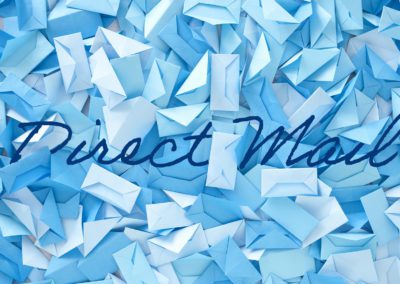I love when a company claims some sort of media is dead, whether it be email, direct mail, or something else, all because the marketing campaigns didn’t work.
The fact of the matter is that it’s very rare for a type of media to “die.” Formats die, but media itself usually doesn’t. (Betamax may be long gone, but home media and recording is still very much a thing.)

When TV first came on the scene, they said radio was dead. I don’t know about you, but I listened to the radio on my drive to the office this week.
The Yellow Pages is still alive and kicking despite the ease of access the internet provides.
I’ve talked before about how email is becoming less effective, especially in terms of marketing. On this page, you’ll see an infographic showing how Google has made it even easier to unsubscribe from emails. Is email dead? Of course not; it’s just not as effective as it was 10 years ago. It’s changed, but it’s still here.
Media often becomes less effective when it “goes out of style.”
Believe it or not, I know people who are making the Yellow Pages work.
I know many people who crush it on the radio.
Even those print newsletters still work in today’s digital age. In fact, they’re working better than ever!
Cutting Through the BS
 So, how do you filter the BS from reality? How do you know, as a small-business owner, what media to use and what to avoid?
So, how do you filter the BS from reality? How do you know, as a small-business owner, what media to use and what to avoid?
Before you decide which avenues to pursue, you need to consider the outcome you desire.
For example, if you want more referrals, a phone, direct mail, or newsletter campaign would be beneficial. Contests and giveaways can also generate more referrals.
If you want more brand-new leads from cold sources, a newsletter isn’t as ideal. The dental industry, as well as a few others, are exceptions to the above statement.
Once you know the outcome you’re aiming for, you now need to avoid one of the most common mistakes in small business: picking the wrong type of media!
Here is a scenario: An entrepreneur wants to get more leads. They are a referral-based business but heard all the buzz about Facebook and decide to jump aboard. They hire an agency that charges $2,500 dollars per month plus ad spend. The business gets less than stellar results. Have you ever experienced this with any media? Pretty much every entrepreneur has.
Who’s to Blame?
 So, why didn’t Facebook work for them? Facebook seems to work for others.
So, why didn’t Facebook work for them? Facebook seems to work for others.
The campaign didn’t work because this fictional business was set up as a referral-based business, not a cold lead generation-based business. You can’t drop cold leads into a warm lead bucket and expect good results.
Although Facebook and/or the agency that was hired will get the blame for this failed campaign, the reality is that it was the entrepreneur’s fault.
It is not the job of the agency to know everything there is to know about your business, how you get leads, and how you convert them — it is the entrepreneur’s job. The agency knows one thing: how to generate leads on Facebook.
But … What if the leads they generate suck?
It’s very likely that the problem doesn’t lie with bad leads, but it’s usually a conversion problem or economic problem on your end. (Economic problem is your ability and/or willingness to spend the required money necessary to generate and convert a lead.)
Experience Though Failure
 I ran into this issue years ago at The Newsletter Pro, and it was so frustrating. At the time, we were set up to get most of our business from referrals — either a referral partner or a direct referral from our customers.
I ran into this issue years ago at The Newsletter Pro, and it was so frustrating. At the time, we were set up to get most of our business from referrals — either a referral partner or a direct referral from our customers.
The first time we started using Facebook for lead generation, it bombed. We generated 550 leads in 30 days but converted zero. These were quality leads too. We had full contact info: name, address, phone number, etc. Many of these should have been good leads, but our system at the time was not set up to convert cold leads to warm leads and then to actual customers. I burned $20k over a few months of this test, and we may have gained one customer — likely someone who already knew me or The Newsletter Pro.
Follow the Lead

Think about your business right now. Are you set up for cold lead generation and conversion? Are you more of a referral-based company? Do you only work with referral partners? There isn’t a right or wrong answer here, but the answer to this question will tell you where you should be focusing your marketing efforts today and will highlight areas you may want to work on or strengthen as your business grows.
When you don’t understand the different types of leads or the leads your business is designed to capture and convert, you set yourself up for disaster. You’ll be left frustrated, it will cost you money and time, and, in the end, your business will suffer for it.
Most business’ lead generation typically falls into one of four types.
- Warm Leads — This type of lead generation comes from referrals from existing customers or warm lead generation sources.
- Cold Leads — This type of lead generation is where you pay for media, like Facebook ads, and convert those cold leads into paying customers.
- Partner Leads — This is a type of lead generation where you get all or nearly all of your leads from a small number of partners who recommend you to their customers: for example, a chiropractor that gets all of his new patients from three personal injury lawyers.
- Bundled Customers — This is where you have a partner relationship that includes your services when a partner sells their services.
The Next Generation
 Once you’re clear on how your business currently operates from a lead generation and conversion standpoint, you can review the different types of media and figure out what works for you.
Once you’re clear on how your business currently operates from a lead generation and conversion standpoint, you can review the different types of media and figure out what works for you.
Can you see how focusing on media that brings in the wrong type of lead could cause issues with converting those leads?
Ideally, you can get to the point of bringing in leads from three or four categories of leads, but right now, you should simply focus on whichever area you’re having success with and double down your marketing for that area. This will allow you to simply win more with what is already working.
Once you’ve picked all the low-hanging fruit in one of the above lead generation categories, you can gear up to learn and implement the next category that makes the most sense for your business model.
I can’t stress enough how important it is for you to know how your company operates from a lead regeneration and conversion standpoint. Without being clear on this point, you will burn a ton of money and spend countless hours frustrated at your marketing/lead generation efforts. You’ll also continue to have “gurus” or marketing salespeople take advantage of you, recommending tactics that simply won’t work for your company.






